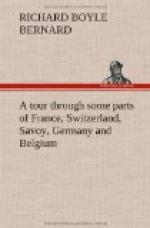Our first stage, after leaving Lausanne, was Morges, which is situated on the lake; it consists chiefly of two well built streets, and carries on a good deal of trade, having a secure port with two moles, which, when seen from a distance, have a good effect, being ornamented with turrets. The church is a handsome edifice of Grecian architecture, and is calculated to accommodate a congregation much more numerous than the town affords. But, in general, modern churches are not to be reproached for being on too large a scale. The public walk is near the water; it is shaded by lofty rows of glens, and presented, when we saw it, a very lively appearance, as it was under its shade that the town of Morges entertained at dinner, two companies of infantry, and their officers, sent from Zurich to garrison Geneva. No place could be better adapted for the purpose, during so hot a season. The conviviality and good humour which prevailed were unbounded, and the patriotic tendency of the toasts, given by those at the upper table, was proved by the cheers with which they were received by all the others.
The road from Morges to Rolle does not continue along the banks of the lake, which is, however, occasionally seen, and heightens the beauty of the country, by the effect produced by its waters. We passed near the town of Aubonne, which is chiefly distinguished by the venerable castle, which formerly protected it from attack, and now adds to the beauty of its appearance. Rolle is a charming village: having neither walls, nor gates, it is denied the title of a town, which it certainly merits more than many paltry places, which have no other pretensions to the name, than the circumstance of their being so enclosed. It consists chiefly of one wide and well built street; it is situated on the lake, which is here very wide, and is surrounded by a country inferior to none we had passed.
There is but little trade carried on here. Its mineral waters are, however, an attraction to strangers, and the society is generally pleasant. Many families of distinction reside in this neighbourhood, and their villas are handsome. I was particularly struck with the situation of one, which had been built by a Dutch gentleman; it was of an oval form and crowned with a dome. We found its owner had lately returned to Holland; his house was shut up, and we could not gratify our curiosity in going over it. After dinner we took a turn on the promenade, which is laid out with great taste. From thence we visited the castle, formerly the residence of the Barons of Rolle, but now vested in the commune by purchase, and applied to various purposes. One part is reserved for public meetings, another as a poor house, and a third portion accommodates the school of the district. We entered into conversation with a person whom we met at the gate (who proved to be the master of the school); and who, after having taken several pinches of snuff from the box of one of our party, became




